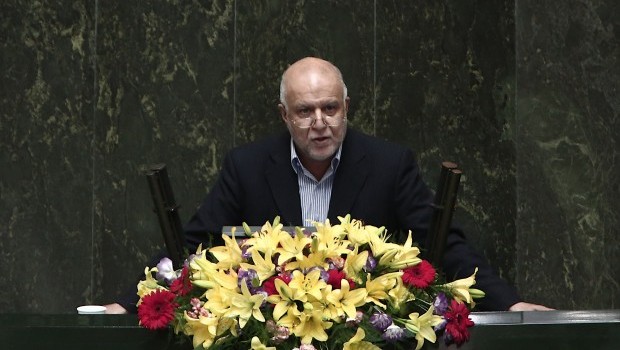
Iranian Oil Minister, Bijan Namdar Zanganeh defends his nomination for the cabinet of President Hassan Rowhani during a parliament session in Tehran on August 15, 2013 (AFP PHOTO/BEHROUZ MEHRI)
Zanganeh approved efforts to begin laying the groundwork for the new body on Wednesday, according to Iran’s ISNA news agency.
Iran’s attempts to counter the embargo imposed by the UN, EU and US on Iran’s oil sector during the Ahmadinejad administration has become a controversial issue within Iranian politics.
It is widely-believed that the previous government launched a policy of selling oil via quasi-private sector brokers in various international markets, mostly in the south-east Asia.
Some figures close to former aides of ex-president Mahmoud Ahmadinejad have been named in Iranian media as Iran’s first ever oil tycoons. Babak Zanjani is the most infamous of the list, and is rumored to have made billions of dollars in proxy deals to sell Iran’s oil and import the hard currency earned in the deals back into the country.
The decision to create a new organization was welcomed by some members of the Iranian association of oil and gas products exporters. One member, Hamid Hosseini, said: “considering the current [sanctions] situation, the country should introduce new methods for selling oil and reform the old methods.”
He added that the new body, suggested earlier by oil minister, Bijan Zangeneh, “is to apply different procedures than the International Affairs Department at Iran’s National Oil Company, which currently holds the responsibility for selling Iran’s oil.”
“The oil minister has started preparations to establish the new organization, but we don’t know when the new body will actually be inaugurated,” Hosseini was quoted as saying by ISNA news agency.
According to ISNA news agency, “Zangeneh had mentioned re-establishing the bodies involved in selling Iran’s oil and the creation of a special organization to deal with the export of oil and petrochemical products in a scheme presented to Iranian parliament, before his candidacy was approved earlier this month.”
The Iranian move decision follows the passage of a bill to tighten sanctions on Iranian oil exports through the lower house of the US Congress in July.
The bill is designed to introduce measures to cut Iran’s oil exports by another one million barrels per day to near zero over the course of a year, in order to reduce the flow of funds to the country’s nuclear program.
According to Reuters, the vote also highlighted a growing divide between Congress and the Obama administration on Iran policy ahead of international talks on the nuclear program.
The Iranian government insists its nuclear project is purely for peaceful purposes, and has dismissed the new sanctions as ineffective and counterproductive in resolving outstanding issues between Iran and Western countries.
“We have no doubts that sanctions are a failed policy,” Iran’s foreign ministry spokesman, Abbas Araqchi, said on August 1, according to quotes published by the website of the state-run broadcaster IRIB.
“Sanctions and intensifying them . . . will only make the nuclear issue more complex and more difficult to resolve,” he added.
